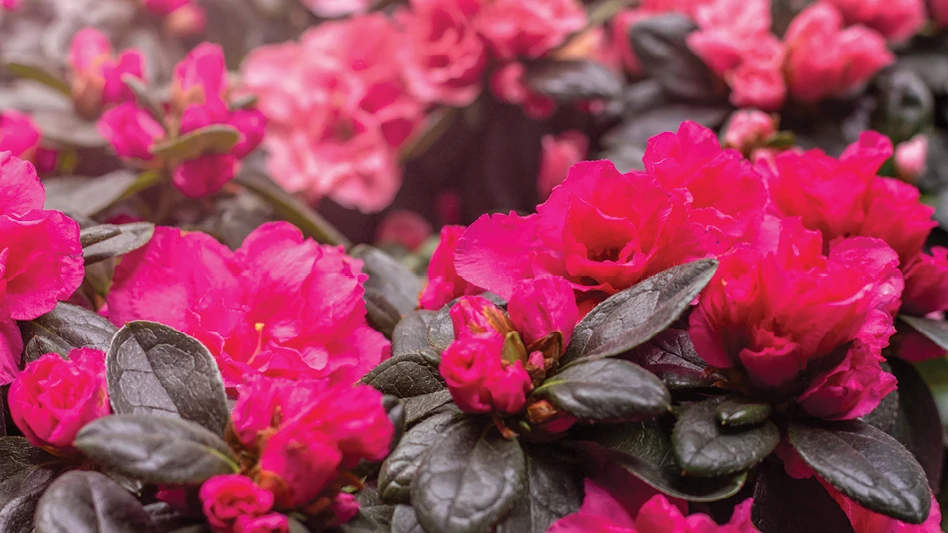|
Greenhouse growers produce crops that improve the environment around them. The benefits of floriculture products both indoors and out are well documented. Two years ago, the company began recycling used containers from its production facilities, and also collects used containers from its customers. In the past two years, Knosher estimates the company has recycled 93,000 pounds of used containers and discarded white polyethylene greenhouse film. The company has also cleaned and reused about 35,000 pots collected from its customers. According to the survey, about 50 percent of growers are now involved with some type of program to recycle used greenhouse film. New statewide programs are making film recycling easier. Several states are following the lead of the New Jersey Department of Agriculture, which implemented a year-round statewide greenhouse film recycling program in 1997. The department estimates that, through the program, New Jersey growers have recycled 7.8 million pounds of used film, and 725,980 pounds in 2010 alone. “As New Jersey growers prepare for spring, they have an opportunity to recycle the plastic film covering their greenhouses and hoop houses, saving them more than 40 percent off of their disposal costs if the materials were landfilled,” said N.J. Secretary of Agriculture Douglas Fisher. “We are proud to have a successful agricultural recycling program, which keeps these plastics out of the waste stream, provides a source for manufacturers using recycled content, saves natural resources and reduces reliance on landfills.”
Regarding irrigation, almost two-thirds of the growers indicated they are better monitoring their crops to determine when they actually need water. Another third have implemented micro-irrigation and more than 10 percent have installed ebb-and-flood systems. Marketing benefits While only 20 percent of the surveyed growers market some of their products as certified organic (only 2.5 percent market all their crops as certified organic), many more are promoting their products as being grown pesticide free. More than 50 percent of the respondents said they market some of their products as pesticide free, while 22.2 percent market all their crops as pesticide free. Almost 20 percent of the growers anticipate moving toward certified organic production in the next 12 months. So Greenhouse Management’s research shows that, indeed, the greenhouse industry is “green.” And it’s getting greener all the time. It’s now time to change the public’s perceptions, and promote our industry as the stewards of the environment that we truly are. For more: Midwest Groundcovers Inc., www.midwestgroundcovers.com; (847) 742-1790. New Jersey Department of Agriculture, www.state.nj.us/agriculture/ |
Get curated news on YOUR industry.
Enter your email to receive our newsletters.
Explore the May 2011 Issue
Check out more from this issue and find your next story to read.
Latest from Greenhouse Management
- Growing enlightened
- American Floral Endowment awards 17 organizations $60,700 in educational grants
- Floral businesses invited to join Society of American Florists' Petal It Forward event in October
- Bioline AgroSciences acquires Viridaxis to strengthen leadership in aphids biocontrol
- Ryley Leech joins JumpLights as vice president of sales
- Meet the Retailers' Choice Awards from 2025 Farwest Show
- Added value
- National Garden Bureau announces featured crops for 2026 'Year of the' program

 But for decades the public has questioned the greenhouse industry’s environmental practices. They see millions of pounds of plastics not getting recycled every year and raise eyebrows. They see high fuel use to heat production houses in winter, and wonder whether greenhouses are being smart with their water use.
But for decades the public has questioned the greenhouse industry’s environmental practices. They see millions of pounds of plastics not getting recycled every year and raise eyebrows. They see high fuel use to heat production houses in winter, and wonder whether greenhouses are being smart with their water use.
 As heating expenses rise, growers are adapting. More than half of respondents stated they’ve altered their production schedules so they’re producing fewer crops during the dead of winter, when heating requirements are at their peak.
As heating expenses rise, growers are adapting. More than half of respondents stated they’ve altered their production schedules so they’re producing fewer crops during the dead of winter, when heating requirements are at their peak.




